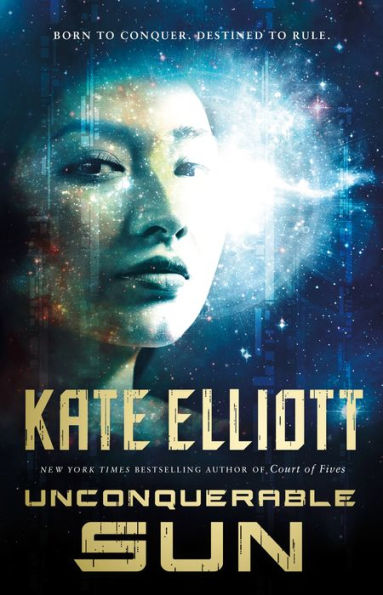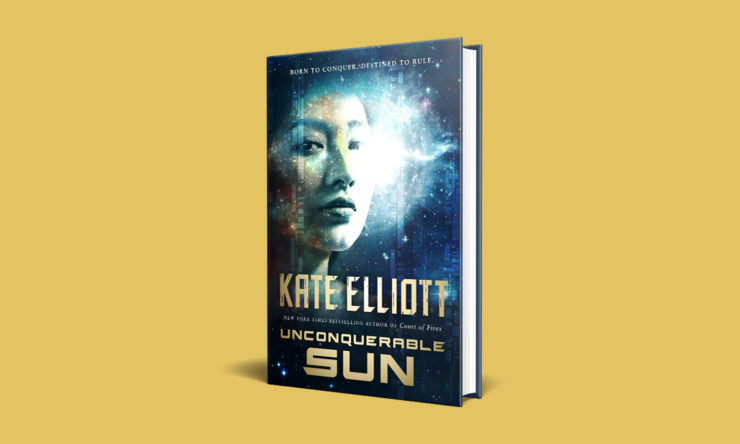Kate Elliott’s Unconquerable Sun is her first foray into novel-length space opera in well over two decades. I’ve been looking forward to it ever since I heard Elliott mention it as a work in progress, some four years ago: “gender-swapped young Alexander the Great in spaaaaaaaaaaace” is exactly the kind of thing that’s narrative catnip for me. Now that I’ve read it, I’m here to tell you in multiple fonts and also ALL CAPS that it’s GOOD and I LOVE IT and YOU SHOULD READ IT NOW… but that’s not exactly a solid basis for a useful review. Unconquerable Sun is substantial, set in a complex world, full of events and interesting characters, and I confess to a paralysing anxiety about doing it proper justice.
It’s been, after all, an anxious kind of year.
Let me begin with a small excursus upon Alexander, whose youth—and whose months-long falling out with his father, Philip of Macedon, over what would be Philip’s final marriage, in the year before Alexander’s accession to the kingship—is the acknowledged inspiration from which Elliott brings us Unconquerable Sun.
The life of Alexander the Great is fertile ground for science fiction and fantasy stories. A young man—and Alexander is one of those historical figures who never outlives his youth: for him there is no settled maturity, no peak of satisfaction, no calm middle-age or decline into twilight years—inheriting a strong kingdom from a vigorous king at the height of his power. Already a respected military leader, he came into his kingdom (possibly through acquiescence in the assassination of Philip) before his strife with his father could blight his prospects or bloom into civil war: acclaimed king at the age of twenty by the nobility and military assembled to celebrate his sister’s wedding, he rapidly consolidated his power and proceeded to spend the next thirteen years of his life in constant warfare. His goal was, it seems, to conquer the known world: an ambition befitting a man who may have thought himself the son of a god—and not an ambition that could ever have realistically been satisfied.
Buy the Book


Inconquerable Sun
In Unconquerable Sun, the eponymous Sun is our Alexander: daughter of Eirene, queen-marshal of the Republic of Chaonia, and already a talented military leader with a track record of victory in the ongoing war with the Phene Empire, her position as Eirene’s heir is threatened when her mother marries a much younger—and wholly Chaonian—noblewoman, from the Lee family. Sun’s father is a prince of the Gatoi, a people held as barbarians who frequently fight for the Phene as mercenaries, and Eirene’s marriage may pave the way to see Sun disinherited—especially as one of Sun’s official Companions is assassinated. His replacement, at the behest of the Lee family, is his twin sister, Persephone Lee.
Perse entered a military academy under an assumed identity at age sixteen in order to get away from her family’s machinations. Five years later, her family pluck her out to be an expendable placeholder in their schemes. Perse is stubborn and canny, and holds most of her family in strong dislike: though Sun doesn’t trust her (and though Perse finds Sun a touch on the abrasive side) Perse would much rather help Sun thrive than see her family manipulate their way into more influence and control. Especially since part of their plan seems to involve assassinating Sun and possibly including Perse as collateral damage.
Meanwhile, other factions, including Sun’s father, are working on their own agendas, with their own priorities, that include the Chaonian succession and the war with the Phene. Elliott builds tension and revelation, counterpointing each to each with something of the rhythm of a thriller: deftly balancing the pace to bring us a compelling coming-of-age in a universe where the SFnal equivalent of reality television and social media has as much importance to politics as military might and dynastic connections. (If Elliott were more interested in hardware, and less in the—far more interesting, by my lights—people and society, it would be possible to consider Unconquerable Sun military SF. But space opera is so much more fun.)
There are three main viewpoint characters in Unconquerable Sun: Sun herself, Persephone, and Apama, a Phene pilot who gives us more of a view on the wider sphere than the Chaonian characters alone would allow. While Sun and Apama’s parts of the narrative are recounted from a third-person viewpoint, Perse is her own narrator. Though switching between “I” and “she” is a little jarring at first, the voices of the characters are sufficiently distinct that it soon becomes part of the novel’s delight. These are compelling characters, even if Sun, like her inspiration, isn’t exactly either restful or forgiving.
Sun, like Alexander, has a Hephaestion: hers is Hetty, her agemate and most trusted companion. This is a setting where queerness is normal (and where rulers may have multiple consorts at once, much as in the Hellenistic Mediterranean), so Hetty and Sun’s relationship includes a sexual element. Perse has her own potentially-burgeoning romance with a Gatoi soldier, but in each case, romance is intimately entangled with politics and more often, takes a back seat to the rest of the action.
There is a lot in this book: I’ve hardly touched on high-octane action scenes and acts of daring, rousing speeches, and cool shit that it contains. I’m kind of deliriously happy with its existence, and incoherently enthusiastic about how—simultaneously—seriously and playfully it uses its influences, and how vivid and engaging it makes its world. It is, in a word, fun. Also very good.
I want to sing its praises only slightly less than I want to read more of Sun and Perse and Apama’s stories. And I desperately want to read more of their stories.
Unconquerable Sun is available from Tor Books.
Liz Bourke is a cranky queer person who reads books. She holds a Ph.D in Classics from Trinity College, Dublin. Her first book, Sleeping With Monsters, a collection of reviews and criticism, was published in 2017 by Aqueduct Press. It was a finalist for the 2018 Locus Awards and was nominated for a 2018 Hugo Award in Best Related Work. Find her at her blog, or find her at her Twitter. She supports the work of the Irish Refugee Council, the Transgender Equality Network Ireland, and the Abortion Rights Campaign.










